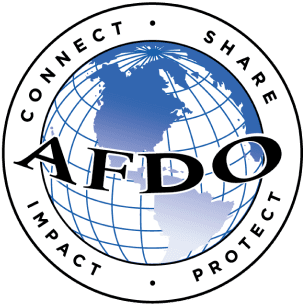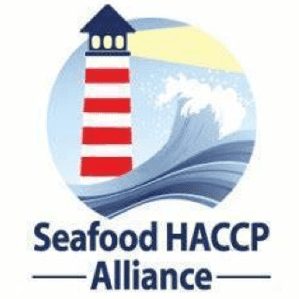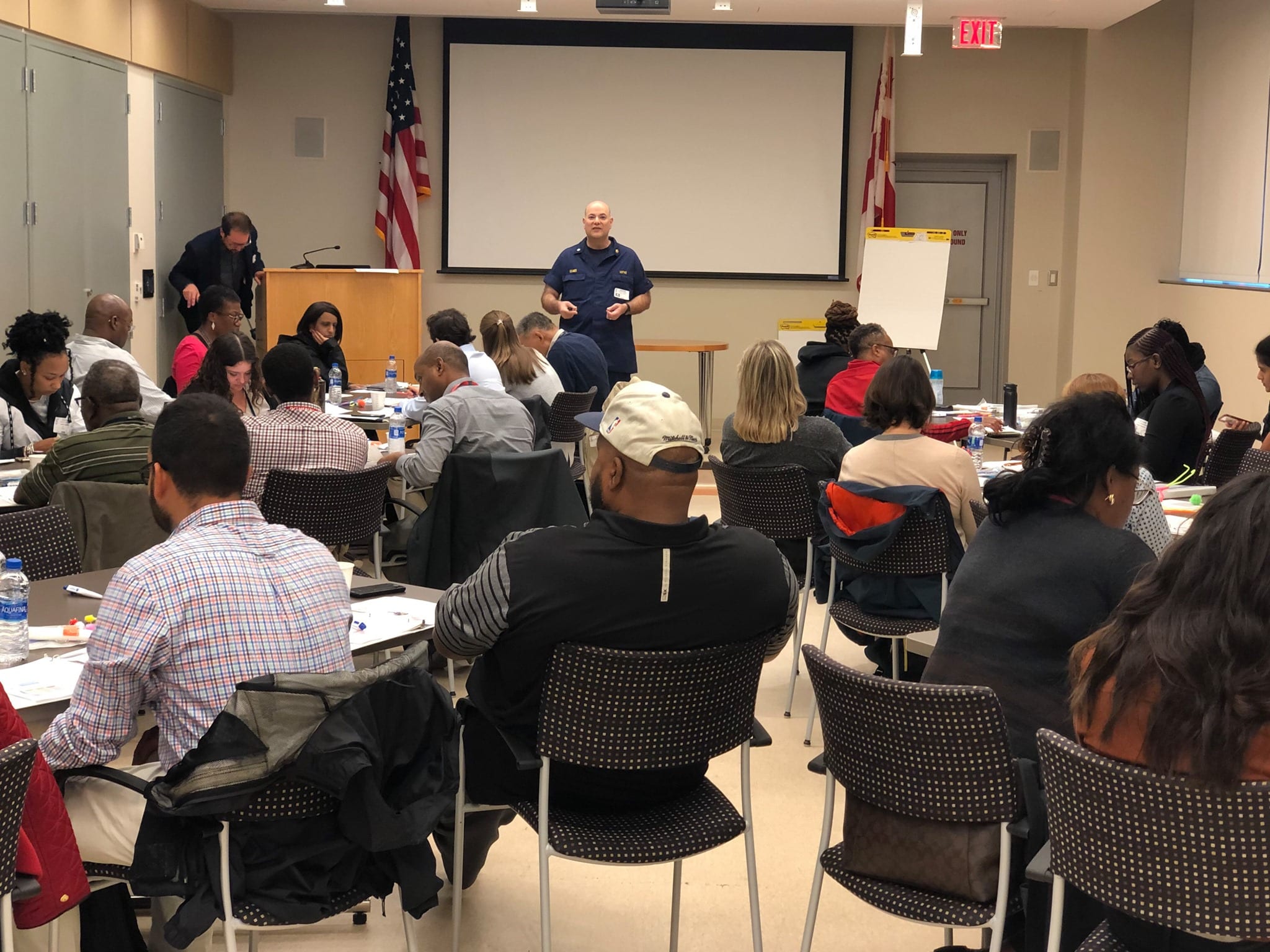Skip to: Course registration | Become a trainer | Protocols | Manuals | Trainer resources | Course conclusion | FAQ’s
SHA and AFDO have worked together to create this page for trainers to explore course registration, trainer certification, and other trainer-related information. Please email haccp@afdo.org with any additional questions or concerns.
Course protocols for Seafood HACCP
Training manuals
Training Materials are available in both English and Spanish. From the University of Florida, IFAS Extension Bookstore.
The HACCP Training Curriculum, 6th edition
Sanitation Control Procedures for Processing Fish and Fishery Products
Trainer resources
Course conclusion
At the end of your course, please email all required documentation to haccp@afdo.org. Be sure to include your course number in the subject line or reply directly to your course approval email from the AFDO office.
The following documents must be completed in full and submitted electronically:
Trainer Worksheet Form
This form is used to import data into the main HACCP database, so do not alter any field names. Participant names should be typed exactly as they should appear on the certificates. The email address provided should be where the certificate will be sent. The email address provided should be unique for each participant and will be used to send their certificate.
Participant Information Sheet
Includes the student data used to fill out the Trainer Worksheet.
Certificate Order Form (Basic HACCP, Segment Two, SCP)
Download Certificate Order Form (Basic HACCP, Segment Two, SCP)
Use this form to order certificates. Be sure to indicate the number of certificates needed and include the correct fee: $60 for Basic HACCP certificates and $40 for SCP certificates. Please note that Segment Two certificates are already paid for during Segment One enrollment via eCornell, unless a participant is taking Segment Two as a refresher and using a SHA/AFDO Basic Seafood HACCP certificate as a prerequisite—in this case, the $60 fee is collected.
Digital Evaluation Form
All training participants should complete the SHA Digital Evaluation. Trainers may use their own survey if they prefer; however, if doing so, they are required to download the participants’ responses from the linked spreadsheet and submit it along with their course closeout paperwork to haccp@afdo.org.
Trainer FAQ’s
Below you will find the most common inquiries from trainers. For questions, please email haccp@afdo.org.
Currently, training materials are only available in English and Spanish. Materials can be purchased or downloaded from the University of Florida’s Sea Grant website: https://www.flseagrant.org/seafood-safety/seafood-haccp-training-and-education/
To register a course, please visit: https://afdo.org/training/sha/seafood-haccp-instructor/registration/
The following information needs to be submitted for each course type:
IN-PERSON BASIC HACCP (16 CONTACT HOURS)
To register, you need to submit:
- Registration Form
- Agenda
- Sample agenda is found on Protocol pages 22-24. We would recommend closely following the sample agenda provided in the Protocol to ensure that your application is approved. Be sure to include morning/afternoon breaks and lunch.
- Download the In-Person Basic HACCP Protocol here
- SHA Hours Verification form (16 Contact Hours)
If you exceed 15 participants, you will need an assistant trainer. The assistant trainer will either need to be SHA qualified with an AFDO Seafood HACCP certificate, or you will need to provide a CV for them, demonstrating their Seafood HACCP experience/background.
VIRTUAL BASIC HACCP (16.5 CONTACT HOURS)
To register, you need to submit:
- Registration Form
- Agenda
- Sample agenda is found on Protocol pages 5-9. We would recommend closely following the sample agenda provided in the Protocol to ensure that your application is approved. Be sure to include morning/afternoon breaks and lunch.
- You can download the Virtual Basic HACCP Protocol here
- Evaluation Form
- Virtual courses require course evaluations to be submitted.
- The course evaluation must include the 5 questions listed on page 3 of the Virtual Basic HACCP Protocol.
- SHA Hours Verification form (16.5 Contact Hours)
- This form ensures that time per topic is being met as prescribed in the Protocol.
Minimum of 1 qualified Trainer for every 8 participants and 1 technical assistant. Note: for classes over 8, the second qualified trainer can serve as technical assistant (list as both below, if applicable). The assistant trainer will either need to be SHA qualified with an AFDO Seafood HACCP certificate, or you will need to provide a CV for them, demonstrating their Seafood HACCP experience/background.
IN-PERSON SEGMENT TWO (6.5 CONTACT HOURS)
To register, you need to submit:
- Registration Form
- Agenda
- Sample agenda is found on Protocol page 25. We would recommend closely following the sample agenda provided in the Protocol to ensure that your application is approved. Be sure to include morning/afternoon breaks and lunch.
- You can download the In-Person Segment Two Protocol here.
If you exceed 15 participants, you will need an assistant trainer. The assistant trainer will either need to be SHA qualified with an AFDO Seafood HACCP certificate, or you will need to provide a CV for them, demonstrating their Seafood HACCP experience/background.
Segment One Course Completion Notice emails from Cornell for each participant. We do not collect these during course submission, but please make sure all of the participants have a CCN email from seafoodhaccp@cornell.edu for completing Segment One that is dated prior to your course start date.
As of April 1, 2023, the Segment Two training must be completed within 9 months of completing the Segment One online course. Anyone enrolled in the Segment One course after 4/1/2023 must complete their Segment Two training within 9 months of completing the online course. Please ensure that your participants have valid CCN emails prior to taking your course. If we don’t have a CCN email from a participant or if the CCN email is dated after your training took place, we cannot issue a certificate.
VIRTUAL SEGMENT TWO (6.5 CONTACT HOURS)
To register, you need to submit:
- Registration Form
- Agenda
- Sample agenda is found on Segment Two Virtual Course Protocol pages 5-6. We would recommend closely following the sample agenda provided in the Segment Two Virtual Course Protocol to ensure that your application is approved. Be sure to include morning/afternoon breaks and lunch.
- You can download the Virtual Segment Two Protocol here
- Evaluation Form
- Virtual courses require course evaluations to be submitted.
- The course evaluation must include the 5 questions listed on page 3 of the Segment Two Virtual Course Protocol.
If you exceed 10 participants, you will need an assistant trainer (20 participants max for virtual setting). The assistant trainer will either need to be SHA qualified with an AFDO Seafood HACCP certificate, or you will need to provide a CV for them, demonstrating their Seafood HACCP experience/background.
Segment One Course Completion Notice emails OR a “Notice of Segment One Completion (pdf)” from Cornell for each participant. While trainers are not required to submit this documentation when registering a course, they are responsible for verifying that all participants have valid proof of Segment One completion prior to the course start date. Segment One completions will be verified for valid dates during the course closeout process when paperwork is submitted to AFDO.
Effective April 1, 2023, Segment Two training must be completed within 9 months of finishing the Segment One online course. Please ensure that each participant provides valid proof of Segment One completion dated within this 9-month widow prior to attending your course. If we do not receive valid proof of completion – or if the completion date is after the training – we won’t be able to issue a certificate.
IN-PERSON SANITATION CONTROL PROCEDURES (SCP) (6.5 CONTACT HOURS)
To register, you need to submit:
- Registration Form
- Agenda
- Sample agenda is found on Protocol page 26. We would recommend closely following the sample agenda provided in the Protocol to ensure that your application is approved. Be sure to include morning/afternoon breaks and lunch.
- You can download the In-Person Sanitation Control Procedures (SCP) Protocol here.
If you exceed 15 participants, you will need an assistant trainer. The assistant trainer will either need to be SHA qualified with an AFDO Seafood HACCP certificate, or you will need to provide a CV for them, demonstrating their Seafood HACCP experience/background.
VIRTUAL SANITATION CONTROL PROCEDURES (SCP) (6.5 CONTACT HOURS)
To register, you need to submit:
- Registration Form
- Agenda
- A sample agenda is found on Protocol pages 4-5. We would recommend closely following the sample agenda provided in the Protocol to ensure that your application is approved. Be sure to include morning/afternoon breaks and lunch.
- You can download the Virtual Sanitation Control Procedures (SCP) Protocol here
If you exceed 10 participants, you will need an assistant trainer (20 participants max for virtual setting). The assistant trainer will either need to be SHA qualified with an AFDO Seafood HACCP certificate, or you will need to provide a CV for them, demonstrating their Seafood HACCP experience/background.
At course completion, please email haccp@afdo.org with the following items:
- Trainer Worksheet (Excel) DO NOT MAKE ANY CHANGES TO THIS SPREADSHEET!
- Participant Information Sheets
- Certificate Order Form. There are only 2 types:
- Basic Seafood HACCP – $50/Participant
- Sanitation Control Procedures (SCP) – $40/Participant
- Course Completion Notice emails from Cornell University
- Segment Two ONLY, must be dated before the course start date.
- As of April 1, Segment Two training must be completed within 9 months of completing the Segment One online course.
- Course Evaluations (Virtual Segment Two & Virtual Basic HACCP courses ONLY)
The course closeout paperwork can also be downloaded from the website here.
Please advise your participant that they can download a PDF of their Notice of Segment One Completion from the eCornell portal using the following steps:
- Go to ecornell.cornell.edu and click Login in the top-right corner.
- Enter your Username and Password.
- From the left-hand menu, select Credentials.
- You’ll see a list of all your certificates and course completions for eCornell courses.
- Locate Seafood HACCP Alliance Segment One Course and click Access Credentials to download your PDF.
While not required, the Seafood HACCP Alliance Executive Committee highly recommends that participants have physical copies of course materials during the training. Based on their extensive experience, the committee members have observed several benefits of using printed materials:
- Improved Engagement: Many participants find that handling physical materials helps them stay more engaged and allows them to take notes directly on the pages.
- Reduced Screen Fatigue: With so much reliance on digital content, using printed materials can provide a welcome break from screens, reducing eye strain and overall fatigue.
- Increased Focus: Printed materials are less prone to digital distractions like notifications and other online content, helping participants concentrate better.
- Better Information Retention: Physical interaction with the material, such as highlighting or writing notes, can enhance memory and comprehension.
- Accessibility: Physical copies ensure that all participants, including those with limited access to digital devices or unstable internet, have equal access to the course content.
liqehlriqhl
As of June 1, 2024, the Seafood HACCP Alliance has restructured its fee collection procedures. A $60 certificate fee is included in the cost of the Segment One online course for those enrolling after June 1. Participants with a Notice of Segment One Completion (pdf) from Cornell University enrolled in Segment One after June 1, 2024, and have already paid the certificate fee. AFDO will not charge trainers to have their certificates issued.
Participants with a Course Completion Notice (CCN) Email from seafoodhaccp@cornell.edu were enrolled in the Segment One course prior to June 1 and have not paid the certificate fee. AFDO will charge the trainer for these participants when processing course closeouts. NOTE: AFDO will honor the $50 certificate fee for all participants enrolled prior to June 1.
Participants who enrolled in Segment One prior to June 1, 2024, will receive a Course Completion Notice (CCN) email as proof of completion.
As of June 1, 2024, Cornell transitioned to a new course platform, eCornell, and implemented a revised course fee structure. Participants who enroll on or after this date will receive a pdf titled “Notice of Segment One Completion” as their official proof of completion.
Please note that after September 1, 2025, CCN emails will no longer be accepted as valid proof of completion for entry into Segment Two.




